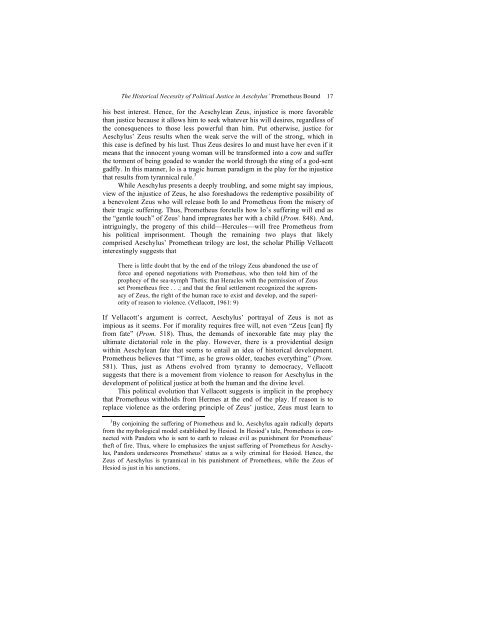You also want an ePaper? Increase the reach of your titles
YUMPU automatically turns print PDFs into web optimized ePapers that Google loves.
The Historical Necessity of Political Justice in Aeschylus’ Prometheus Bound 17<br />
his best interest. Hence, for the Aeschylean Zeus, injustice is more favorable<br />
than justice because it allows him to seek whatever his will desires, regardless of<br />
the conesquences to those less powerful than him. Put otherwise, justice for<br />
Aeschylus’ Zeus results when the weak serve the will of the strong, which in<br />
this case is defined by his lust. Thus Zeus desires Io and must have her even if it<br />
means that the innocent young woman will be transformed into a cow and suffer<br />
the torment of being goaded to wander the world through the sting of a god-sent<br />
gadfly. In this manner, Io is a tragic human paradigm in the play for the injustice<br />
that results from tyrannical rule. 3<br />
While Aeschylus presents a deeply troubling, and some might say impious,<br />
view of the injustice of Zeus, he also foreshadows the redemptive possibility of<br />
a benevolent Zeus who will release both Io and Prometheus from the misery of<br />
their tragic suffering. Thus, Prometheus foretells how Io’s suffering will end as<br />
the “gentle touch” of Zeus’ hand impregnates her with a child (Prom. 848). And,<br />
intriguingly, the progeny of this child—Hercules—will free Prometheus from<br />
his political imprisonment. Though the remaining two plays that likely<br />
comprised Aeschylus’ Promethean trilogy are lost, the scholar Phillip Vellacott<br />
interestingly suggests that<br />
There is little doubt that by the end of the trilogy Zeus abandoned the use of<br />
force and opened negotiations with Prometheus, who then told him of the<br />
prophecy of the sea-nymph Thetis; that Heracles with the permission of Zeus<br />
set Prometheus free . . .; and that the final settlement recognized the supremacy<br />
of Zeus, the right of the human race to exist and develop, and the superiority<br />
of reason to violence. (Vellacott, <strong>19</strong>61: 9)<br />
If Vellacott’s argument is correct, Aeschylus’ portrayal of Zeus is not as<br />
impious as it seems. For if morality requires free will, not even “Zeus [can] fly<br />
from fate” (Prom. 518). Thus, the demands of inexorable fate may play the<br />
ultimate dictatorial role in the play. However, there is a providential design<br />
within Aeschylean fate that seems to entail an idea of historical development.<br />
Prometheus believes that “Time, as he grows older, teaches everything” (Prom.<br />
581). Thus, just as Athens evolved from tyranny to democracy, Vellacott<br />
suggests that there is a movement from violence to reason for Aeschylus in the<br />
development of political justice at both the human and the divine level.<br />
This political evolution that Vellacott suggests is implicit in the prophecy<br />
that Prometheus withholds from Hermes at the end of the play. If reason is to<br />
replace violence as the ordering principle of Zeus’ justice, Zeus must learn to<br />
3 By conjoining the suffering of Prometheus and Io, Aeschylus again radically departs<br />
from the mythological model established by Hesiod. In Hesiod’s tale, Prometheus is connected<br />
with Pandora who is sent to earth to release evil as punishment for Prometheus’<br />
theft of fire. Thus, where Io emphasizes the unjust suffering of Prometheus for Aeschylus,<br />
Pandora underscores Prometheus’ status as a wily criminal for Hesiod. Hence, the<br />
Zeus of Aeschylus is tyrannical in his punishment of Prometheus, while the Zeus of<br />
Hesiod is just in his sanctions.

















